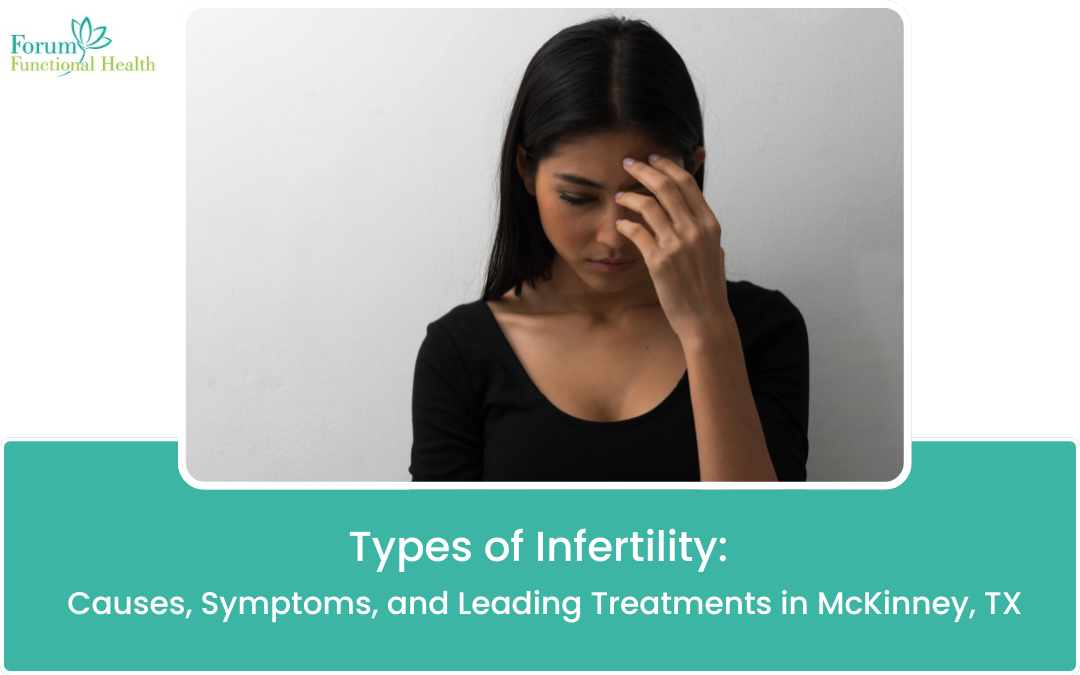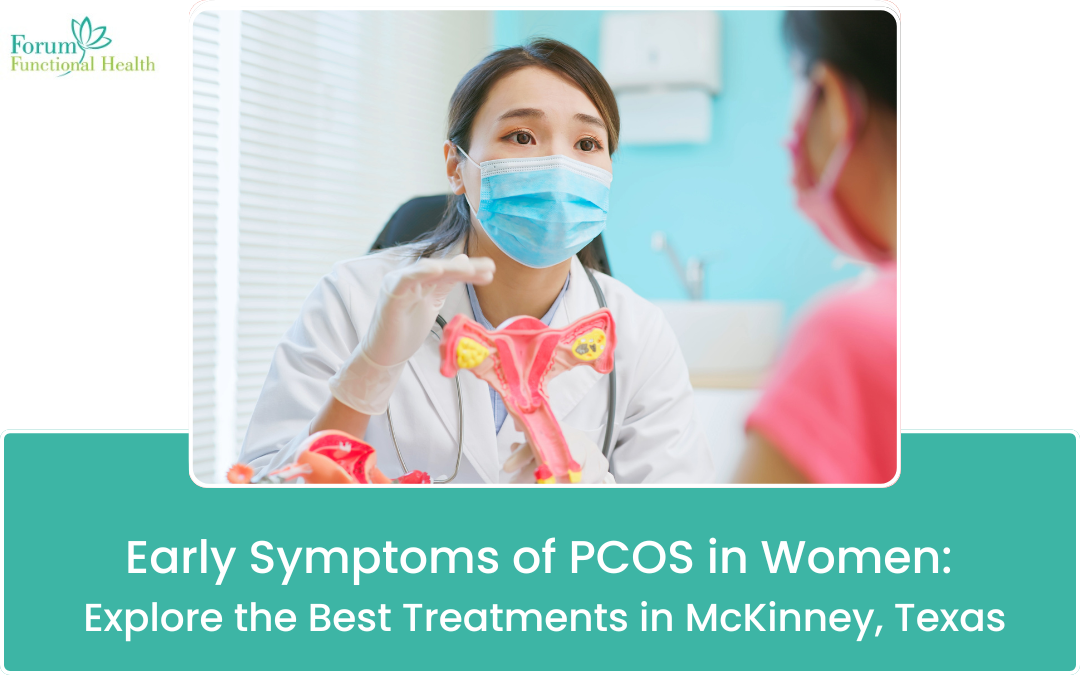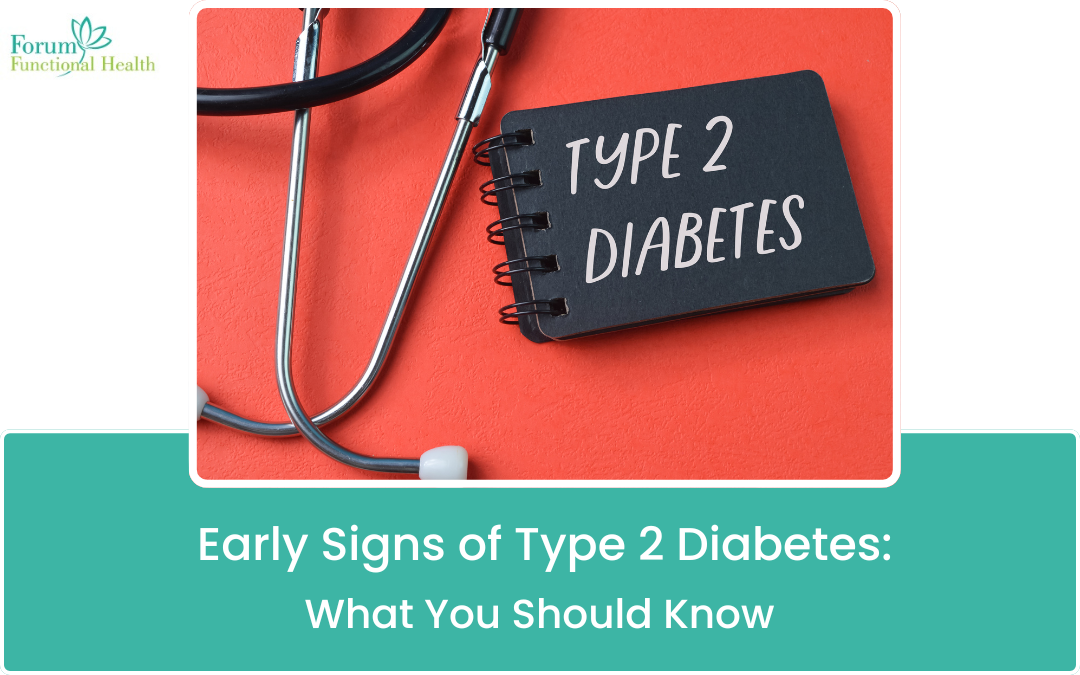
by Forum Functional Health Center | Jul 1, 2024 | Depression
Supporting a loved one with depression can be challenging but incredibly important. Depression is more than just feeling sad; it’s a serious mental health condition that affects every aspect of a person’s life. If you’re looking for ways to help, understanding how to offer the right kind of support is crucial. Here, we’ll provide you with strategies to assist your loved one in their journey toward recovery.
Understanding Depression
Depression is a medical condition that requires professional treatment. It’s not something that one can simply “snap out of.” Recognizing the symptoms and understanding the nature of depression can help you empathize with what your loved one is going through. Symptoms include persistent sadness, loss of interest in activities, changes in appetite, and trouble sleeping.
Educate Yourself
One of the best ways to support someone with depression is to educate yourself about the condition. Learn about the symptoms, causes, and treatments. Understanding depression can help you provide informed and compassionate support.
Key Points to Remember:
- Listen Without Judgment: Your loved one needs to feel heard and understood. Be a patient listener and avoid giving unsolicited advice.
- Encourage Professional Help: Guide them to seek professional assistance. The Forum Functional Health Center in Texas offers comprehensive care tailored to individual needs.
- Offer Practical Help: Assist with daily tasks that may seem overwhelming to them, such as cooking, cleaning, or running errands.
- Be Patient: Recovery takes time, and it’s important to remain patient and supportive throughout the journey.
Encourage Healthy Lifestyle Changes
A healthy lifestyle can play a significant role in managing depression. Encourage your loved one to engage in activities that promote physical and mental well-being.
Suggestions Include:
- Exercise Regularly: Physical activity can boost mood by releasing endorphins.
- Balanced Diet: Eating nutritious meals can have a positive impact on mood and energy levels.
- Adequate Sleep: Ensure they maintain a regular sleep schedule.
- Mindfulness and Relaxation: Practices like yoga and meditation can reduce stress and improve mental health.
Seek Professional Help
Professional treatment is essential for managing depression effectively. Encourage your loved one to consult healthcare professionals who can provide the necessary treatment and support.
Options for Treatment:
- Therapy: Cognitive Behavioral Therapy (CBT) and other forms of psychotherapy can be highly effective.
- Medication: Antidepressants may be prescribed to help manage symptoms.
- Functional Health Approach: For a holistic approach, consider the Depression Treatment in McKinney, Texas They offer personalized treatment plans that address the root causes of depression.
Create a Supportive Environment
Creating a supportive home environment can make a significant difference in your loved one’s recovery.
Tips for a Supportive Environment:
- Reduce Stress: Minimize sources of stress and create a calming environment.
- Open Communication: Keep the lines of communication open and let them know you are there for them.
- Positive Reinforcement: Celebrate small victories and progress in their recovery journey.
Take Care of Yourself
Supporting someone with depression can be emotionally taxing. It’s important to take care of your own mental and physical health as well.
Self-Care Tips:
- Seek Support: Talk to friends, family, or a counselor about your feelings.
- Set Boundaries: Ensure you set healthy boundaries to avoid burnout.
- Engage in Self-Care: Participate in activities that you enjoy and that help you relax.
Conclusion
Supporting a loved one with depression requires patience, understanding, and a willingness to help. By educating yourself, encouraging professional treatment, and creating a supportive environment, you can make a significant difference in their recovery. For specialized care and comprehensive treatment options, consider the Forum Functional Health Center in McKinney, Texas, where expert professionals are dedicated to providing effective depression treatment in Texas. Remember, your support and encouragement can be a powerful tool in your loved one’s journey towards wellness.
For more information and resources, Contact Forum Functional Health Center in Texas.
Read More:- Understanding High-Functioning Depression: Key Symptoms You Shouldn’t Ignore

by Forum Functional Health Center | Jun 28, 2024 | Fatigue
Infertility is a common issue that affects many couples trying to conceive. Understanding the types of infertility, their causes, symptoms, and the treatments available can be crucial for those facing this challenge. In McKinney, TX, Forum Functional Health Center offers specialized services to help individuals navigate their infertility journey. This blog post explores the different types of infertility, their underlying causes, symptoms, and the leading treatments available at the Functional Health Center in Texas.
Types of Infertility
- Primary Infertility
- This type occurs in couples who have never been able to conceive after at least one year of unprotected sex.
- Secondary Infertility
- This refers to couples who have been able to get pregnant at least once but are now unable to conceive.
- Unexplained Infertility
- In some cases, no specific cause for infertility can be identified even after thorough medical evaluation.
Causes of Infertility
Infertility can result from various factors, affecting either partner or both. Common causes include:
- Hormonal Imbalances: Disruptions in hormone levels can affect ovulation in women and sperm production in men.
- Structural Issues: Blockages or abnormalities in the reproductive organs can impede conception.
- Lifestyle Factors: Stress, poor diet, smoking, and alcohol use can contribute to infertility.
- Medical Conditions: Conditions like polycystic ovary syndrome (PCOS), endometriosis, and thyroid disorders can impact fertility.
Symptoms of Infertility
The primary symptom of infertility is the inability to conceive. However, there are other signs that may indicate fertility issues, such as:
- Irregular Menstrual Cycles: Women may experience irregular or absent periods.
- Hormonal Changes: Symptoms like hair loss, weight gain, and acne can be related to hormonal imbalances.
- Sexual Dysfunction: Issues like erectile dysfunction in men or pain during intercourse in women can be linked to infertility.
Leading Treatments for Infertility in McKinney, TX
Forum Functional Health Center in McKinney, TX, provides a comprehensive range of infertility treatments in McKinney tailored to individual needs. Some of the leading treatments include:
- Hormonal Therapy: Balancing hormone levels to promote regular ovulation and improve sperm production.
- Lifestyle Modifications: Addressing factors like diet, stress, and weight management through personalized plans.
- Surgical Interventions: Procedures to correct structural issues in the reproductive organs.
- Assisted Reproductive Technologies (ART): Techniques such as in vitro fertilization (IVF) and intrauterine insemination (IUI) to assist with conception.
For those struggling with weight issues that might impact fertility, weight loss management treatment in McKinney, TX is also available at the Functional Health Center in Texas. This holistic approach ensures that patients receive comprehensive care to improve their overall health and fertility outcomes.
Conclusion
Understanding the types, causes, and symptoms of infertility is the first step towards seeking appropriate treatment. If you are experiencing infertility, the Functional Health Center in McKinney, Texas, is here to help. They offer a range of effective treatments designed to address the unique needs of each patient. For more information on related health topics, check out our guide on recognizing the early signs of gastrointestinal disease and available gastrointestinal treatment in McKinney.
By addressing the root causes of infertility and utilizing advanced treatment options, the Forum Functional Health Center aims to support individuals and couples on their journey to parenthood and schedule a consultation.
Read More:- Can High Cholesterol Cause Fatigue? Understanding Fatigue Syndrome Treatment in McKinney

by Forum Functional Health Center | Jun 26, 2024 | Fatigue
Feeling extremely tired is an all-too-common complaint that can significantly impact your daily life. Whether it’s difficulty concentrating, a lack of motivation, or just an overwhelming sense of exhaustion, fatigue can disrupt your routine and well-being. Understanding the reasons behind this persistent tiredness and finding effective treatments is crucial. In Texas, particularly at the Forum Functional Health Center, comprehensive fatigue treatment is available to help you regain your energy and vitality.
Understanding Fatigue: What Causes It?
Fatigue can stem from various factors, both physical and emotional. Identifying the root cause is the first step towards effective treatment. Here are some common reasons why you might be feeling extremely tired:
Poor Sleep Quality
One of the most obvious causes of fatigue is poor sleep quality. If you’re not getting enough rest or if your sleep is frequently interrupted, it can lead to chronic tiredness. Sleep disorders like insomnia, sleep apnea, and restless legs syndrome can significantly affect the quality of your sleep.
Nutritional Deficiencies
Your diet plays a crucial role in your energy levels. Deficiencies in essential nutrients like iron, vitamin B12, and vitamin D can lead to fatigue. Ensuring you have a balanced diet rich in these nutrients is vital for maintaining your energy.
Chronic Stress
Stress, whether from work, personal life, or other sources, can take a toll on your body. Chronic stress can lead to physical and emotional exhaustion, making you feel constantly tired.
Medical Conditions
Various medical conditions can cause fatigue, including thyroid disorders, diabetes, heart disease, and chronic fatigue syndrome. It’s important to consult with healthcare professionals to rule out or treat these underlying issues.
Sedentary Lifestyle
A lack of physical activity can contribute to feelings of tiredness. Regular exercise helps boost your energy levels by improving blood circulation and oxygen flow throughout your body.
Addressing Fatigue: Effective Treatments at Forum Functional Health Center
When it comes to fatigue treatment in Texas, the Forum Functional Health Center in McKinney, Texas, offers a comprehensive approach. Their team of experts focuses on identifying the root cause of your fatigue and creating a personalized treatment plan to help you regain your energy.
Comprehensive Health Evaluation
At the Functional Health Center in McKinney, Texas, the first step in treating fatigue is a thorough health evaluation. This includes a detailed medical history, physical examination, and various diagnostic tests to identify any underlying conditions contributing to your tiredness.
Personalized Nutrition Plans
Proper nutrition is key to combating fatigue. The Forum Functional Health Center provides personalized nutrition plans tailored to your specific needs. By addressing any nutritional deficiencies and optimizing your diet, you can significantly improve your energy levels.
Stress Management Techniques
Managing stress is crucial for reducing fatigue. The health experts at the Functional Health Center offer various stress management techniques, including mindfulness practices, counseling, and relaxation strategies, to help you cope with stress effectively.
Exercise Programs
Regular physical activity is essential for maintaining energy levels. The center provides customized exercise programs designed to fit your lifestyle and fitness level, helping you incorporate more movement into your daily routine.
Sleep Optimization
Improving sleep quality is a significant aspect of fatigue treatment. The Forum Functional Health Center offers guidance on sleep hygiene practices and may recommend treatments for any underlying sleep disorders to ensure you get the rest you need.
Embracing a Healthier, More Energetic Life
Living with constant fatigue can be incredibly challenging, but with the right approach and support, you can overcome it. The Functional Health Center in Texas is dedicated to helping you identify the cause of your fatigue and providing effective treatments to restore your energy and quality of life.
Conclusion
Feeling extremely tired is more than just an inconvenience; it can affect every aspect of your life. By understanding the potential causes and seeking comprehensive treatment, such as the services offered at the Forum Functional Health Center in McKinney, Texas, you can take proactive steps towards regaining your vitality.
If you’re struggling with persistent fatigue, don’t wait any longer to seek help. Reach out to the experts and start your journey towards feeling better today. Fatigue treatment in McKinney, Texas is just a call away
Read More:- How Do Hormones Affect Women’s Behavior?

by Forum Functional Health Center | Jun 24, 2024 | Hormone Health
Hormones play a pivotal role in regulating various physiological processes in the body, significantly impacting women’s behavior and emotions. Understanding these effects can lead to better health management and overall well-being. At the Forum Functional Health Center in McKinney, Texas, we specialize in addressing hormonal imbalances to help women achieve optimal health.
The Role of Hormones in Women’s Lives
Hormones are chemical messengers produced by glands in the endocrine system. They travel through the bloodstream to tissues and organs, affecting various bodily functions. In women, hormones like estrogen, progesterone, and testosterone are crucial for regulating reproductive cycles, mood, and energy levels.
Hormonal Fluctuations and Behavioral Changes
Menstrual Cycle
Throughout the menstrual cycle, women experience fluctuations in estrogen and progesterone levels. These hormonal shifts can lead to mood swings, irritability, and changes in energy levels. Many women report feeling more anxious or depressed in the days leading up to their period, a condition known as premenstrual syndrome (PMS).
Pregnancy
Pregnancy brings about significant hormonal changes. Increased levels of estrogen and progesterone are necessary to support the developing fetus but can also cause mood swings, fatigue, and anxiety. Understanding these changes can help expectant mothers manage their mental and emotional well-being more effectively.
Menopause
Menopause marks the end of a woman’s reproductive years and is characterized by a decline in estrogen and progesterone levels. This hormonal change can lead to symptoms such as hot flashes, mood swings, and depression. The Functional Health Center in McKinney, Texas offers treatments to help women manage these symptoms and improve their quality of life.
Hormonal Imbalances and Behavior
When hormones are out of balance, women can experience a range of physical and emotional symptoms. Common causes of hormonal imbalances include stress, poor diet, lack of exercise, and medical conditions such as polycystic ovary syndrome (PCOS) and thyroid disorders.
Symptoms of Hormonal Imbalances
- Mood Swings: Sudden, unexplained changes in mood can be a sign of hormonal imbalance. Women may feel happy one moment and irritable the next.
- Fatigue: Persistent tiredness despite adequate rest can indicate an imbalance in thyroid hormones.
- Weight Gain: Hormonal imbalances can lead to weight gain, especially around the abdomen. The Functional Health Center in Texas offers comprehensive weight loss management treatments in McKinney, TX to address these issues.
- Anxiety and Depression: Imbalances in estrogen and progesterone can contribute to feelings of anxiety and depression.
Effective Hormonal Imbalance Treatment in McKinney
At the Forum Functional Health Center, we provide personalized treatments to address hormonal imbalances. Our approach includes:
Comprehensive Assessments
We begin with thorough assessments to identify hormonal imbalances. This includes blood tests, saliva tests, and a detailed review of symptoms and medical history.
Customized Treatment Plans
Based on the assessment results, we create personalized treatment plans. These may include bioidentical hormone replacement therapy (BHRT), nutritional counseling, and lifestyle modifications to restore hormonal balance.
Lifestyle and Nutritional Support
Proper nutrition and a healthy lifestyle are crucial for maintaining hormonal balance. We provide guidance on diet, exercise, and stress management to support overall health and well-being.
Ongoing Monitoring and Support
Regular follow-ups and adjustments to treatment plans ensure that women receive the best possible care. Our team at the Functional Health Center in McKinney, Texas is dedicated to helping women achieve and maintain hormonal balance.
The Emotional Impact of Hormonal Imbalances
Dealing with hormonal imbalances can be challenging both physically and emotionally. Women may feel frustrated by persistent symptoms and the impact on their daily lives. Understanding that these feelings are common and seeking professional help can make a significant difference. At the Forum Functional Health Center, we provide compassionate care and effective treatments to support women’s emotional and physical health.
Conclusion
Hormones have a profound effect on women’s behavior and overall well-being. Understanding these effects and seeking appropriate treatment can lead to improved health and a better quality of life. If you are experiencing symptoms of hormonal imbalance, consider reaching out to the Forum Functional Health Center for personalized care and support. Our experts are here to help you navigate your health journey with confidence and clarity.
Read More:- When Should You Test for Hormone Imbalance? Expert Tips and Insights

by Forum Functional Health Center | Jun 21, 2024 | Hormone Health
Hormones play a crucial role in maintaining the body’s overall balance and health. From regulating metabolism to influencing mood, energy levels, and reproductive health, hormones impact nearly every aspect of our lives. But when they get out of balance, it can lead to a host of problems. If you’re experiencing symptoms such as fatigue, weight gain, mood swings, or irregular menstrual cycles, it might be time to consider testing for hormone imbalance. In this blog post, we’ll explore the best times to test for hormone imbalances and provide expert tips and insights to help you navigate this important health check.
Understanding Hormone Imbalance
Before diving into the timing of hormone tests, it’s essential to understand what a hormone imbalance is. Hormone imbalances occur when there is too much or too little of a hormone in the bloodstream. This can be due to various factors, including stress, diet, age, medical conditions, and lifestyle choices. Symptoms of hormone imbalance can be subtle or severe, and they often mimic other health issues, making it critical to get an accurate diagnosis.
Key Symptoms Indicating Hormone Imbalance
- Fatigue: Persistent tiredness despite adequate rest.
- Weight Fluctuations: Unexplained weight gain or loss.
- Mood Swings: Sudden changes in mood, anxiety, or depression.
- Irregular Menstrual Cycles: Changes in the regularity or intensity of periods.
- Sleep Disturbances: Difficulty falling or staying asleep.
- Skin and Hair Changes: Acne, hair loss, or increased facial hair.
Optimal Timing for Hormone Imbalance Testing
Testing for hormone imbalances requires careful timing to ensure accurate results. Hormone levels fluctuate throughout the day and are influenced by various factors such as stress, diet, and the menstrual cycle. Here are some expert tips on when to test:
1. For Women: Menstrual Cycle Considerations
Women should consider their menstrual cycle when scheduling hormone tests. The best time to test for most reproductive hormones, such as estrogen and progesterone, is during the luteal phase of the cycle, typically around day 21. For accurate results, it’s crucial to track your cycle and consult with a healthcare provider to determine the best testing window.
2. Morning Testing for Cortisol
Cortisol, the body’s primary stress hormone, follows a daily rhythm, peaking in the early morning and gradually decreasing throughout the day. For the most accurate measurement, cortisol should be tested between 7 and 9 AM.
3. Fasting for Insulin and Blood Sugar Levels
For hormones related to metabolism, such as insulin, fasting tests are usually required. Schedule your test in the morning after an overnight fast to get the most accurate readings of your insulin and blood sugar levels.
4. Consistent Timing for Thyroid Hormones
Thyroid hormones, including TSH, T3, and T4, should be tested at the same time of day each time you test. This consistency helps provide a more accurate picture of your thyroid function over time.
Expert Insights from Forum Functional Health Center
At the Functional Health Center in McKinney, Texas, experts emphasize the importance of individualized testing. Each person’s hormone levels and needs are unique, and a one-size-fits-all approach doesn’t work. The center offers comprehensive hormonal testing and personalized treatment plans to address imbalances effectively.
Personalized Hormonal Imbalance Treatment in McKinney, Texas
If you suspect a hormone imbalance, seeking professional help is crucial. At the Functional Health Center in McKinney, Texas, experienced practitioners use advanced diagnostic tools to identify imbalances accurately. They provide tailored treatment plans that may include lifestyle changes, dietary adjustments, supplements, and hormone replacement therapy to restore balance and improve overall well-being.
The Emotional Impact of Hormone Imbalance
Living with a hormone imbalance can be emotionally challenging. The unpredictable symptoms can affect your daily life, relationships, and mental health. Many people feel frustrated, anxious, and overwhelmed by their symptoms. Understanding that these feelings are valid and seeking support is essential. The Forum Functional Health Center provides a compassionate and supportive environment, helping you feel heard and cared for throughout your treatment journey.
The Road to Balance: What to Expect
When you decide to test for hormone imbalances, you’re taking an important step toward better health. Here’s what you can expect:
- Initial Consultation: Discuss your symptoms, medical history, and concerns with a healthcare provider.
- Comprehensive Testing: Undergo blood, saliva, or urine tests to measure hormone levels.
- Diagnosis and Treatment Plan: Receive a detailed diagnosis and a personalized treatment plan.
- Ongoing Support: Regular follow-ups and adjustments to your treatment plan as needed.
Why Choose Forum Functional Health Center?
Choosing the right healthcare provider is crucial for managing hormone imbalances effectively. The Functional Health Center in Texas stands out for its holistic approach, combining advanced medical expertise with personalized care. Their team is dedicated to helping you achieve optimal health and well-being through tailored treatments and ongoing support.
Conclusion: Take Charge of Your Hormonal Health
Hormone imbalances can significantly impact your quality of life, but timely and accurate testing can make all the difference. By understanding when to test for hormone imbalances and seeking expert guidance, you can take control of your health and start your journey towards balance and well-being.
If you’re experiencing symptoms of hormone imbalance, don’t wait. Reach out to the Contact Functional Health Center in McKinney, Texas today and take the first step towards a healthier, happier you.
Read More:- How to Get Your Hormones Back in Balance

by Forum Functional Health Center | Jun 19, 2024 | Menopause & Perimenopause
Perimenopause, the transitional phase leading up to menopause, can be a challenging time for many women. Understanding the signs that perimenopause is coming to an end can bring relief and a sense of control. If you’re experiencing symptoms and seeking effective perimenopause treatment in McKinney, Texas, Forum Functional Health Center offers comprehensive care. Here are ten signs that your perimenopause might be nearing its conclusion.
1. Menstrual Cycle Changes
A clear sign that perimenopause is ending is when your menstrual cycles become less frequent. If you haven’t had a period for 12 consecutive months, you have officially reached menopause.
2. Hot Flashes Subside
Hot flashes are a hallmark of perimenopause. As you near the end, you may notice a decrease in their frequency and intensity, signaling a shift in your hormonal balance.
3. Sleep Patterns Stabilize
Insomnia and disrupted sleep are common during perimenopause. When these issues start to resolve, it can be a sign that your body is adjusting and perimenopause is concluding.
4. Mood Swings Decrease
Fluctuating hormones can lead to mood swings during perimenopause. As your body stabilizes, you might find your mood becoming more consistent.
5. Reduced Vaginal Dryness
Vaginal dryness is often caused by decreased estrogen levels. When this symptom improves, it suggests that your hormonal levels are stabilizing.
6. Improved Cognitive Function
Many women experience brain fog during perimenopause. If you’re finding it easier to concentrate and your memory is improving, it might indicate that perimenopause is ending.
7. Decreased Breast Tenderness
Hormonal changes can cause breast tenderness. A reduction in this symptom can be a sign that your body is adjusting to a new hormonal baseline.
8. Changes in Libido
Perimenopause can affect your sex drive. If your libido is returning to what feels normal for you, it might be a sign that perimenopause is nearing its end.
9. Weight Stabilization
Many women struggle with weight gain during perimenopause due to hormonal fluctuations. If your weight starts to stabilize, it could indicate that perimenopause is ending.
10. Overall Physical Well-being
An overall improvement in your physical well-being, including less joint pain and fewer headaches, can signal the end of perimenopause.
Comprehensive Care at Forum Functional Health Center
If you’re in McKinney, Texas, and looking for personalized care, the Forum Functional Health Center offers specialized perimenopause treatment. Our team understands the unique challenges of perimenopause and provides holistic and effective solutions to manage and alleviate symptoms. We also offer treatments for related conditions, such as thyroid disease treatment in McKinney, TX, to ensure comprehensive health support.
Take Charge of Your Health
Recognizing these signs can help you understand and navigate the end of perimenopause. If you’re experiencing symptoms that disrupt your life, seeking professional help can make a significant difference. At the Forum Functional Health Center in McKinney, Texas, we’re committed to helping you achieve optimal health during and after perimenopause, Let’s Contact us Now
Read More:- Understanding the 34 Symptoms of Perimenopause

by Forum Functional Health Center | Jun 17, 2024 | Polycystic ovary syndrome (PCOS)
Polycystic Ovary Syndrome (PCOS) is a common hormonal disorder that affects many women of reproductive age. Early detection and treatment are crucial for managing symptoms and preventing long-term complications. In McKinney, Texas, the Forum Functional Health Center offers comprehensive care tailored to the unique needs of women with PCOS. This article will explore the early symptoms of PCOS and highlight the best treatment options available at the Functional Health Center in McKinney, Texas.
Understanding PCOS: Early Symptoms to Watch For
PCOS can present a wide array of symptoms, making it challenging to diagnose without professional guidance. Here are some early signs to look out for:
1. Irregular Menstrual Cycles
One of the most common symptoms of PCOS is irregular or absent menstrual periods. Women may experience fewer than nine periods a year, or periods may occur more than 35 days apart.
2. Excess Hair Growth (Hirsutism)
Women with PCOS often experience excessive hair growth on the face, chest, back, or other areas where men typically grow hair. This condition is known as hirsutism and is caused by elevated levels of androgens.
3. Acne and Oily Skin
High androgen levels can also lead to persistent acne and unusually oily skin. These symptoms can continue well past the teenage years and are often resistant to standard treatments.
4. Weight Gain and Difficulty Losing Weight
PCOS can make it challenging to maintain a healthy weight. Many women with PCOS struggle with weight gain and find it difficult to lose weight despite their best efforts.
5. Thinning Hair on the Scalp
While experiencing hair growth in unwanted areas, women with PCOS may also notice thinning hair on their scalp. This condition, known as androgenic alopecia, can be distressing and impact self-esteem.
6. Darkening of the Skin
Acanthosis nigricans, characterized by dark, velvety patches of skin, often appears in body creases such as the neck, groin, and underarms. This symptom is associated with insulin resistance, which is common in women with PCOS.
Comprehensive Treatment Options in McKinney, Texas
Managing PCOS requires a holistic and individualized approach. At the Forum Functional Health Center’s best PCOS treatments in McKinney, Texas, women can access a range of treatments designed to address the root causes of PCOS and alleviate symptoms.
1. Lifestyle Modifications
Lifestyle changes, including a balanced diet and regular exercise, are foundational in managing PCOS. The Functional Health Center in McKinney, Texas, provides personalized nutrition and fitness plans to help women achieve and maintain a healthy weight, improve insulin sensitivity, and reduce the risk of developing diabetes.
2. Hormonal Therapy
For women experiencing irregular menstrual cycles or severe symptoms, hormonal therapy may be recommended. Birth control pills, anti-androgen medications, and insulin-sensitizing drugs are commonly used to regulate menstrual cycles, reduce androgen levels, and manage symptoms.
3. Fertility Treatments
Women with PCOS who are trying to conceive may benefit from fertility treatments. The specialists at the Functional Health Center in McKinney, Texas, offer various options, including ovulation induction medications and assisted reproductive technologies like in vitro fertilization (IVF).
4. Natural and Integrative Therapies
Forum Functional Health Center integrates natural therapies, such as herbal supplements and acupuncture, to support hormonal balance and overall well-being. These treatments are often used alongside conventional medical approaches to enhance their effectiveness.
5. Psychological Support
Living with PCOS can be emotionally challenging. The Functional Health Center provides counseling and support groups to help women cope with the emotional aspects of PCOS and develop effective stress management strategies.
Why Choose Forum Functional Health Center?
The Forum Functional Health Center in McKinney, Texas, stands out for its patient-centered approach and commitment to holistic care. The experienced team of healthcare professionals collaborates closely with each patient to develop personalized treatment plans that address the unique needs of women with PCOS.
By combining cutting-edge medical treatments with integrative therapies, the Forum Functional Health Center ensures comprehensive care that promotes long-term health and wellness. Women with PCOS can feel confident that they are receiving the best possible care tailored to their individual needs.
Conclusion
Early recognition and management of PCOS are crucial for improving quality of life and preventing long-term health issues. The Forum Functional Health Center in McKinney, Texas, offers a wide range of effective treatments to help women manage their symptoms and lead healthier lives. If you suspect you may have PCOS or are seeking expert care, consider reaching out to the Functional Health Center in McKinney, Texas, for comprehensive and compassionate support.
Read More:- Does Stress Cause Thyroid Disease? Top Treatments in McKinney, TX

by Forum Functional Health Center | Jun 14, 2024 | Thyroid disease
Stress is an inevitable part of modern life, but did you know it could be affecting your thyroid health? Many people in McKinney, TX, are seeking answers and effective treatments for thyroid disease, and understanding the link between stress and thyroid health is crucial. Let’s dive into the connection between stress and thyroid disease and explore the top treatments available at Forum Functional Health Center, a leading functional health center in McKinney, Texas.
Understanding the Link: Stress and Thyroid Disease
How Stress Impacts Thyroid Function
Stress triggers a complex response in your body, impacting your endocrine system, which includes the thyroid gland. When you’re stressed, your body releases cortisol, a hormone produced by the adrenal glands. Chronic stress leads to prolonged cortisol exposure, which can interfere with thyroid hormone production and regulation.
This disruption can contribute to thyroid diseases such as hypothyroidism (underactive thyroid) and hyperthyroidism (overactive thyroid). Symptoms of thyroid disorders include fatigue, weight gain or loss, mood swings, and more, making it essential to address stress as part of your thyroid health strategy.
Top Treatments for Thyroid Disease at Forum Functional Health Center
Personalized Thyroid Treatment Plans
At Forum Functional Health Center, each patient receives a personalized treatment plan tailored to their specific needs. This approach ensures that you get the most effective care for your thyroid condition, addressing both the symptoms and underlying causes.
Comprehensive Functional Health Approach
The functional health center in McKinney, Texas, takes a holistic approach to thyroid disease treatment. This includes a thorough evaluation of your overall health, lifestyle, and stress levels. By understanding the root causes of your thyroid issues, the center’s experts can develop a comprehensive treatment plan that promotes long-term wellness.
Stress Management Techniques
Stress management is a cornerstone of thyroid disease treatment in Mckinney TX at Forum Functional Health Center. Techniques such as mindfulness meditation, yoga, and counseling are integrated into your treatment plan to help reduce stress and improve thyroid function. These practices not only alleviate stress but also enhance your overall well-being.
Nutritional Support
Proper nutrition plays a vital role in thyroid health. The experts at the functional health center in McKinney, Texas, provide tailored dietary recommendations to support your thyroid function. This includes foods rich in selenium, zinc, and iodine, which are essential for thyroid hormone production.
Advanced Testing and Monitoring
Forum Functional Health Center uses advanced testing methods to monitor your thyroid function and track your progress. Regular follow-ups and adjustments to your treatment plan ensure that you receive the best possible care.
Why Choose Forum Functional Health Center in McKinney, Texas?
Expertise and Compassion
The team at Forum Functional Health Center is dedicated to providing expert care with a compassionate touch. They understand the challenges of living with thyroid disease and are committed to helping you achieve optimal health.
Holistic and Integrative Care
This functional health center in McKinney, Texas, integrates conventional and alternative therapies to provide a holistic approach to thyroid disease treatment. By combining the best of both worlds, they offer effective and comprehensive care that addresses the root causes of your condition.
Patient-Centered Approach
At Forum Functional Health Center, you are more than just a patient – you are a partner in your health journey. The center’s patient-centered approach ensures that your voice is heard, and your treatment plan is tailored to your unique needs and goals.
Take Control of Your Thyroid Health Today
Stress may be an unavoidable part of life, but it doesn’t have to control your health. If you’re struggling with thyroid disease, seeking treatment at Forum Functional Health Center in McKinney, Texas, can help you manage stress and improve your thyroid function. With personalized care, a holistic approach, and a team of compassionate experts, you can take control of your thyroid health and live a vibrant, fulfilling life.
Read More:- The Impact of Stress on Thyroid Function: What You Should Know

by Forum Functional Health Center | Jun 12, 2024 | Diabetes Management
Type 2 diabetes is a chronic condition that affects millions of people worldwide, and its early detection can make a significant difference in managing the disease effectively. At Forum Functional Health Center, our focus is on helping you understand these early signs and take proactive steps toward better health. If you live in McKinney, Texas, and are concerned about type 2 diabetes, this guide is for you.
Understanding Type 2 Diabetes
Type 2 diabetes occurs when your body becomes resistant to insulin or when the pancreas cannot produce enough insulin. Insulin is crucial for regulating blood sugar levels, and when it doesn’t function properly, glucose accumulates in the blood. This can lead to serious health complications if not managed properly.
Common Early Signs of Type 2 Diabetes
Recognizing the early signs of type 2 diabetes can help you seek timely treatment and avoid complications. Here are some common symptoms to watch out for:
1. Increased Thirst and Frequent Urination
One of the most noticeable early signs of type 2 diabetes is increased thirst (polydipsia) and frequent urination (polyuria). High blood sugar levels cause the kidneys to work harder to filter and absorb the excess glucose, leading to more frequent trips to the bathroom.
2. Unexplained Weight Loss
Despite eating normally, people with type 2 diabetes might experience unexplained weight loss. This happens because the body starts burning fat and muscle for energy when it cannot use glucose effectively.
3. Fatigue and Weakness
Feeling unusually tired and weak can be another early sign of type 2 diabetes. When your cells don’t get enough glucose, your energy levels drop, leading to persistent fatigue.
4. Blurred Vision
High blood sugar levels can cause the lens of the eye to swell, leading to temporary blurred vision. If left untreated, this can result in more serious eye problems.
5. Slow-healing sores and Frequent Infections
People with type 2 diabetes often notice that cuts and sores take longer to heal. High blood sugar levels can impair blood flow and affect your body’s ability to heal. This also increases the risk of infections.
6. Tingling or Numbness in Hands and Feet
Nerve damage caused by high blood sugar can lead to a sensation of tingling or numbness in the hands and feet. This condition is known as diabetic neuropathy and can become more severe over time.
Seeking Help: Forum Functional Health Center
If you recognize any of these early signs, it’s crucial to seek medical advice promptly. At Forum Functional Health Center, we offer comprehensive care for individuals with type 2 diabetes treatment in McKinney, Texas. Our approach focuses on personalized treatment plans that address the root causes of the disease and promote overall well-being.
Comprehensive Type 2 Diabetes Treatment in McKinney, TX
At our Functional Health Center in McKinney, Texas, we understand that managing type 2 diabetes requires a holistic approach. Our team of experts is dedicated to providing you with the best care possible, including:
- Customized Nutrition Plans: Proper nutrition is vital for managing blood sugar levels. We create personalized meal plans that cater to your specific needs and preferences.
- Exercise Programs: Regular physical activity helps improve insulin sensitivity and overall health. Our exercise programs are tailored to your fitness level and health goals.
- Stress Management: Stress can impact blood sugar levels. We offer strategies and support to help you manage stress effectively.
- Ongoing Monitoring: Regular check-ups and monitoring are essential for managing diabetes. We provide continuous support to ensure your treatment plan is effective.
Emotional Impact of Type 2 Diabetes
Living with type 2 diabetes can be challenging, not just physically but emotionally as well. It’s normal to feel overwhelmed, anxious, or even depressed. At Forum Functional Health Center, we believe in addressing the emotional aspects of diabetes care. Our compassionate team is here to support you every step of the way, offering counseling and support groups to help you cope with the emotional challenges of living with diabetes.
Taking Control of Your Health
Early detection and proper management of type 2 diabetes can significantly improve your quality of life. By recognizing the early signs and seeking help from a trusted healthcare provider like Forum Functional Health Center, you can take control of your health and prevent complications.
If you’re experiencing any of the early signs of type 2 diabetes or are looking for comprehensive type 2 diabetes treatment in McKinney, TX, don’t hesitate to reach out to us. Our team is here to help you every step of the way.
Conclusion
Recognizing the early signs of type 2 diabetes is crucial for timely intervention and effective management. At Forum Functional Health Center, we are committed to providing personalized care and support for individuals with type 2 diabetes in McKinney, Texas. By taking proactive steps and seeking professional help, you can manage your condition and lead a healthier, happier life. Remember, early detection is key—don’t wait to take control of your health.
Read More:- What Causes Type 2 Diabetes? Learn the Key Risk Factors

by Forum Functional Health Center | Jun 11, 2024 | Weight Management
Losing weight naturally is a goal many strive for, but the journey can often feel overwhelming. Fortunately, with the right approach and mindset, shedding those extra pounds can become a fulfilling experience. At Forum Functional Health Center, we believe in empowering you with holistic and sustainable methods to achieve your weight loss goals. Whether you’re looking for a Functional Health Center in McKinney, Texas, or a weight loss clinic in McKinney TX, our tips and strategies will guide you on your path to a healthier you.
Understanding Natural Weight Loss
Natural weight loss revolves around making consistent, healthy lifestyle changes rather than relying on quick fixes. This approach not only helps you lose weight but also maintains it in the long run, promoting overall well-being.
1. Embrace a Balanced Diet
A balanced diet is the cornerstone of natural weight loss. Focus on whole foods such as fruits, vegetables, lean proteins, and whole grains. Avoid processed foods and high-sugar items. Here’s how you can start:
- Eat Plenty of Vegetables: Vegetables are low in calories but high in nutrients. Incorporate a variety of colors and types to ensure you get a broad range of vitamins and minerals.
- Choose Lean Proteins: Opt for chicken, fish, tofu, and legumes to keep you feeling full and satisfied.
- Incorporate Whole Grains: Whole grains like quinoa, brown rice, and oats provide sustained energy and keep you fuller for longer.
2. Stay Hydrated
Drinking water is essential for weight loss. It helps to flush out toxins, improve digestion, and can even reduce hunger. Aim for at least eight glasses a day, and consider starting each meal with a glass of water.
3. Regular Exercise
Physical activity is vital for burning calories and building muscle. Find an exercise routine that you enjoy, whether it’s walking, running, swimming, or attending fitness classes at a weight loss clinic in McKinney TX. Aim for at least 30 minutes of moderate exercise most days of the week.
4. Get Enough Sleep
Quality sleep is often overlooked but is crucial for weight loss. Lack of sleep can lead to weight gain by increasing hunger hormones. Aim for 7-9 hours of sleep per night to help regulate your metabolism and appetite.
Mindful Eating Habits
5. Practice Mindful Eating
Mindful eating means paying full attention to your eating experience, from hunger cues to the taste and texture of food. This practice helps you enjoy your food more and can prevent overeating. Try these tips:
- Eat Slowly: Take your time to chew and savor each bite.
- Listen to Your Body: Eat when you’re hungry and stop when you’re full.
- Avoid Distractions: Turn off the TV and put away your phone while eating.
6. Portion Control
Portion control is critical for natural weight loss. Using smaller plates and being aware of serving sizes can help you avoid overeating. Additionally, being mindful of portions when dining out can significantly contribute to maintaining a healthy weight.
Emotional and Mental Well-being
7. Manage Stress
Stress can significantly impact your weight by leading to emotional eating and poor food choices. Incorporating stress management techniques like yoga, meditation, or spending time at a Functional Health Center in McKinney, Texas, can help you maintain a balanced mind and body.
8. Seek Support
Having a support system can make a huge difference in your weight loss journey. Whether it’s family, friends, or a professional at Forum Functional Health Center, having people to share your progress and challenges with can provide motivation and accountability.
9. Set Realistic Goals
Setting small, achievable goals keeps you motivated and on track. Instead of focusing solely on the number on the scale, set goals related to healthy habits, such as walking a certain number of steps per day or cooking more meals at home.
The Role of Functional Health Centers
10. Personalized Care at Forum Functional Health Center
At Forum Functional Health Center, we understand that everyone’s weight loss journey is unique. Our holistic approach focuses on personalized care, considering all aspects of your health, from nutrition to mental well-being. If you’re looking for a Functional Health Center in McKinney, Texas, we provide comprehensive support and resources to help you achieve your weight loss goals naturally and sustainably.
Conclusion
Natural weight loss is a gradual process that involves making sustainable lifestyle changes. By embracing a balanced diet, staying hydrated, exercising regularly, and focusing on mindful eating, you can achieve and maintain a healthy weight. At Forum Functional Health Center, we’re here to support you every step of the way. Visit our weight loss clinic in McKinney TX and start your journey towards a healthier, happier you today!
Read More:- Understanding How Extra Weight Affects Your Health










